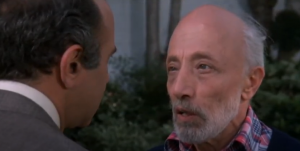In show business, age is not just a number but a treasure trove of experiences, memories, and narratives waiting to be unveiled. For senior actors, the stage or screen is not just a platform but a sanctuary where the richness of their journey comes to life, evoking emotions that transcend generations.
I put a lot of thought into the difference between senior monologues and what I call “regular” monologues.
One of the vital aspects that make senior citizen monologues profoundly touching is their authenticity. They are stories carved from the intricate designs of life, shaped by years of triumph, loss, joy, and despair. These narratives echo the undying spirit of resilience and the grace that comes with aging. They are not just recitations but reflections of lived experiences that pull at the heartstrings of the audience, offering them a glimpse into the world through the eyes of age.
The character-driven monologues breathe life into the silent echoes of the past. They’re reminiscent of journeys marked by victories, scars, lessons, and love. For senior actors, these pieces offer a sanctuary to revisit, relive, and retell their silent stories. The accounts are laced with profound wisdom, offering the audience more than entertainment — a journey through the annals of time, led by souls who have walked the paths that many are yet to tread.
Free Monologues from DirectSubmit NYCastings
One popular theme within these monologues embraces the beauty and pain of memories. Senior actors find resonance in narratives that allow them to navigate through the corridors of the past. Each story is a celebration of moments – the milestones that shaped them, the missteps that molded them, and the memories that define them. In every recitation, the audience is invited into a world where every wrinkle, every smile, and every tear tells a story of a life well-lived.
Family dynamics offer another avenue from which powerful monologues for seniors spring. The complexities, joys, and challenges of familial relationships provide a canvas where senior actors paint pictures with words, their voices echoing the myriad emotions that define family. Stories of parenthood, sibling rivalry, love, and loss are told with a rawness that only those who have lived through can deliver.
 In Kenneth Johnson’s miniseries “V”, Jewish character Abraham Bernstein tells his unwilling son why they have to help the neighbors hide. While it’s a short monologue about the Holocaust, it packs a powerful punch, one that the audience will remember forever.
In Kenneth Johnson’s miniseries “V”, Jewish character Abraham Bernstein tells his unwilling son why they have to help the neighbors hide. While it’s a short monologue about the Holocaust, it packs a powerful punch, one that the audience will remember forever.
Journeys of self-discovery are integral in these monologues as well. Life’s third act offers a perspective enriched by years of experiences and learning. Senior actors find empowerment in narratives that explore self-reflection, acceptance, and transformation. These stories are not anchored in the sunset of life but are rather a testament to the dawn that aging brings; a celebration of the wisdom, freedom, and self-assurance that comes with the years.
Senior monologues are also marked by stories of legacy and contributions. Through soul-stirring narratives, senior actors impart the wisdom of age, echoing the enduring spirit of a generation that has weathered storms and basked in the sun. These monologues tell stories of perseverance, resilience, and the indomitable human spirit that transcends age.
These monologues are not merely performances but a bridge connecting generations. They offer a testament to the enduring spirit of senior citizens, a reminder that every age brings with it stories worth telling, worth hearing. Through the powerful delivery by elder actors, audiences are reminded that life’s sunset is not a whisper of goodbye but a symphony of legacies, a collection of stories that will resonate through time.
In every line delivered, every emotion conveyed, a universal truth is unveiled — that the richness of life is not measured by the years but by the stories that define our journey. And for senior actors, every monologue is an opportunity to tell those silent stories, to echo the unuttered narratives and to remind the world that every age is a collection of beauty, strength, and resilience.
How Senior Actors Should Choose a Monologue
Preparing for a monologue, regardless of age, involves a combination of understanding the character, connecting with the emotions of the scene, and effective rehearsal. Here’s a guide specifically tailored for senior actors preparing for a monologue:
Choose a Suitable Monologue:
Select a monologue that resonates with you and aligns with your experiences and emotions. Look for pieces that allow you to draw upon the richness of your life journey.
Understand the Character and Context:
Dive deep into the character’s background, circumstances, and emotional state. Understand the context of the monologue within the larger story to bring authenticity to your performance.
Embrace Your Own Experience:
Use your own life experiences to enhance the authenticity of the character. If the monologue involves reflecting on personal experiences, draw parallels to your own life to make the performance more genuine.
Connect Emotionally:
Identify the emotional core of the monologue. What is the character feeling, and how can you connect with those emotions on a personal level? Seniors often bring a wealth of life experiences to their performances, making emotional connections profound and sincere.
Work on Vocal Projection and Clarity:
Pay attention to your voice. Ensure that your lines are delivered with clarity and projection. This is particularly important for seniors, as clear and articulate speech enhances the impact of the monologue.
Physical Expression and Body Language:
Consider the physical aspects of your performance. While a monologue may not involve extensive movement, body language and facial expressions play a crucial role in conveying emotions. Practice gestures and facial expressions that complement the emotions in the monologue.
Memorization:
Memorize your lines thoroughly. Being comfortable with the script allows you to focus more on the emotional delivery and connection with the audience. Use memory aids like note cards or recordings during the initial stages of memorization.
Rehearse with Intent:
Rehearse with a specific focus on emotions and pacing. Experiment with different tones, tempos, and pauses to find what works best for the character and the overall mood of the monologue.
Seek Feedback:
Share your performance with trusted friends, acting coaches, or fellow actors. Constructive feedback can provide valuable insights and help refine your delivery.
Reflect and Iterate:
Take time to reflect on your performance. Consider what aspects can be improved and iterate on your delivery. Continuous refinement leads to a more polished and impactful monologue.







